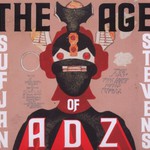The Age of Adz
Studio Album by Sufjan Stevens released in 2010Futile Devices | |
Too Much | |
Age of Adz | |
I Walked | |
Now That I'm Older | |
Get Real Get Right | |
Bad Communication | |
Vesuvius | |
All for Myself | |
I Want to Be Well | |
Impossible Soul |
The Age of Adz review
Sufjan Stevens has too many things to do
Sufjan Stevens’ ideas and too big and diversified to be realized by one man, even if he is very talented. Seteves, a multi-instrumentalist who was born in Michigan, from time to time gets lost in his own initiations as he does not know what he should start first and what he should finish faster. He made his way to a big stage with records called Illinois, and Michigan, out of the series of records united by the title Fifty States Project. Although he promised to release analogous works about California and Oregon, Stevens abruptly changed the course of his creative research and took interest in completely different themes. For instance, Seven Swans features profound studies of Biblical stories and is still considered by many Sufjan’s most mature and proficient effort. His new long player, The Age Of Adz, has nothing to do with Seven Swans in terms of music and lyrics, which should not be a big surprise to you. By now, we must have been adjusted to the fact that Sufjan Stevens prefers diversity in everything.
Stevens thinks about the dark side
When the summer 2010 was close to its end, Sufjan Stevens posted in Internet an EP called All Delighted People. It can be an EP only formally because, in fact, this is quite an extensive work based on the title song presented in two variants. That album shaped Stevens’ new concept that he is going to stick to in the near future. Presently, the musician’s mind is occupied with the ideas of apocalypses and existentialism. Only a month and a half later, he dropped a full-format record under the title The Age Of Adz. It is taken from the art by Royal Robertson, an artist who was also captivated by the concepts of the end of the world. The album’s opener, Futile Devices, is rather an intro that only helps you see that Stevens is through with banjo and folk he used to love dearly. For seventy five minutes, you are going to be surrounded by an unimaginable acoustic world which combines incompatible things. Stevens exploited the thought about fusing primate, lo-fi computer games effects with orchestral arrangements to back up his cold voice appearing to go straight from under the ground.
The Age Of Adz is a gloomy and complex message
The Age Of Adz does not have a story that would embrace the entire set, but there is an evil or wicked spirit, a scent of trouble, premonition of danger that haunt each track. Wide use of electronic music with distinctly heavy and monotonous beats accentuates the feeling of doom hanging over you. Vesuvius begins seemingly like another tale about a volcano that destroyed antic towns and that has no relation with us or Stevens. However, then he states that he is like a volcano whose malicious force is housed deep inside and ready to be unleashed at any moment. I Want To Be Well has a tempo that changes several times, but the closing part of the song turns into an acoustic madness of chaotic special effects and piled voices which produce an impression that the main character’s desire to get well will never come true. The last track is the reason why the album crosses the hour mark easily. The twenty-three minute Impossible Soul is a long story of hurting the loving one and being forgiven, a collection of endless parts of strings, horns and keys entwined by unsteady, nervous electronic. This is what Sufjan Stevens decided to offer us this time, a dark message that is difficult to decipher.

